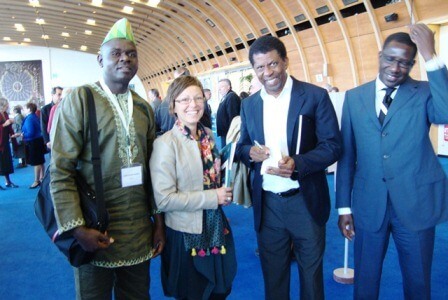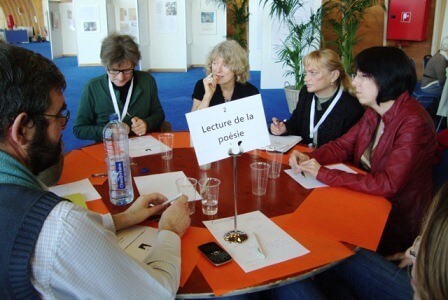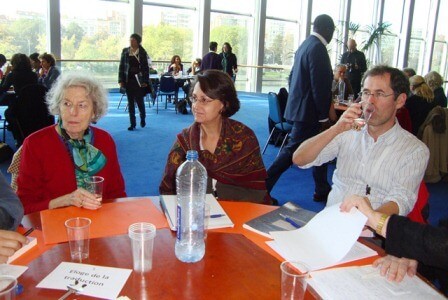XXVII Biennale Internationale De Poesie 2012
I was invited to attend the 27th International Biennial of Poetry that took place in the Congress Hall of Liege (Belgium) from 10th to 13th October 2012. Poets from 33 countries attended. This major event was put under the presidency of Dany Laferriere, Haitian poet, novelist and script–writer (Medicis Prize 2009) and articulated around the theme “Must Poetry Be Absolutely Modern?”
During the event the poet Mohammed El Amraoui presented his paper entitled “Poesie Marocaine et Modernite?”; Scarfman Ronnie, poet from USA, presented “Writing Contemporary Midrash”; Frajlich Anna, Poland-USA poet, spoke on “Must Poetry be absolutely Modern.” Christopher Okemwa, poet from Kenya presented a paper entitled “Must Poetry Be Absolutely Modern?: A Case of Kenya’s Hybrid Poetry.”
Day 1: Wednesday, 10th October 2012
 This was the first day of the event. Registration took place on this day. There was a workshop on translation, poetic recital “voices from elsewhere, welcome reception, drink, dinner, a dialogue on “Modernity and writing in Haiti,” between Dany Laferriere and Lucien Noullez and a debate with the audience.
This was the first day of the event. Registration took place on this day. There was a workshop on translation, poetic recital “voices from elsewhere, welcome reception, drink, dinner, a dialogue on “Modernity and writing in Haiti,” between Dany Laferriere and Lucien Noullez and a debate with the audience.
On this day I met with the event’s organizers: Quiam Jouiyed, Frederique Longee, etc. I also met Ogawa Shizue, poet feom japan, Hafedh Yasmin, poet from Austria, Atangana Maximilien the drum expert from Cameroon, Batumike Cikuru, poet from Congo
Day 2: Thursday, 11th October 2012
On this day we had activities of the “poetry Childhood" day initiative. We also had slam, poetry spoken word. I met young people who had come to attend the event.
In the evening at 7 pm, co-ordinated by Romy Souery, we had a reception at the Palais des Prines Eveques. We were addressed by an official, after which we parted in groups. Our group, led by Jean Loubry, went to Podiums III: Barricades, where we read our poems. The poets who read their poems at barricades were: Bensat Andres, Pierre Schroven, Benoit Magnat, Rome deguergue, Ana Frajlich, Alice-Catherine Carls, Dominique Massaut, Ioan Lascu, Andre Ughetto, Jacques Fournier, Daniel Duguas, Christopher Okemwa, Iasonas Stavrakis, Michael Curtis, Laus Strandby Nielsen, Kazem Shahryari, Yasmin Hafedh, Rita Bassil, Jah Mae Kan.
It was a great evening, full of rain, and happy moments, sharing, drinking and laughter.
Day 3: Friday, 12th October 2012
On this day there were round table discussions. Round tables provided opportunity for participants to share their views and for all to speak up.Twelve round tables were organized. One had to choose a topic and take a sit at the related table. Each round table welcomed a maximum of 10 participants. Some sessions took place in French while others in English.
The topics covered by table one was “Deontology and literary criticism” in which they looked at poets who also double up as critics. They are members of juries, give lectures, or introduce authors. As in any other trade, among poets too you find hierarchies, conflicts, more or less interested friendships, how are you supposed to retain a balanced judgement? What are the main deontological rules in literary criticism? The panel here was to suggest possible trails to find our way together in such thorny issues. The panel was led by Jean-Luc Wauthier (Belgium), Yves Namur (Belgium and Marc Dugardin (Belgium)
Another table discussed on “Reading Poetry.” This table answered questions such as: What do we read poetry? How do we read poems? Is reading poems any different from reading fiction or essay? This panel was led by Jean Loubry (Belgium), Primaelle Vertenoeil (Belgium), Ange Gabriel (France), Lambert Schechteer(Gd Duche Du Luxembourg), Kazem Shahryari (France). The panel found out that reading poems is something special, an action that requires a particular state of mind (and state of heart).
“Poetry and multiple cultures,” was a topic discussed by another table under the tutelage of Alice-Catherine Carls (USA-France), Jan Mysjkin (Dutch speaking Belgium), Serge Chamchinov (France), Jah Mae Kan (moderator), Tibor Papp (Hongrie) and Benoist Magnat (Suisse). This group discussed about songs, hip hop, rhythms, graphs, graphisms, performances, circus, videos and other devices. The panel found out that poetry was alive and kicking outside the cover of books. It runs all sorts of creative trails.
 Another table dealt with the topic “Poetry and Orality” This panel was led by poets who are practising this new forms of orality: Dany Laferriere (Canada), Luc Baba (Belgium), Antoine Wauters (Belgium), Andre Ughetto (France) and Dominique Massaut (Belgium). The panel found out that poetry emerged out of orality. All great founding myths were told or sung in verse long before they were written down. The trend, it seems, is retrieving its roots. Poetry slams, for instance, the group found out, testified to it. They found out that poetry was again embodied in the speaking body.
Another table dealt with the topic “Poetry and Orality” This panel was led by poets who are practising this new forms of orality: Dany Laferriere (Canada), Luc Baba (Belgium), Antoine Wauters (Belgium), Andre Ughetto (France) and Dominique Massaut (Belgium). The panel found out that poetry emerged out of orality. All great founding myths were told or sung in verse long before they were written down. The trend, it seems, is retrieving its roots. Poetry slams, for instance, the group found out, testified to it. They found out that poetry was again embodied in the speaking body.
The next group discussed “In Praise of Translation,” which was led by Esther Orner(in French), Xavier Thunis (Belgium), Ricardo Domeneck(Brazil), Kirsti Simonsuuri( Finland) and Alice-Catherine Carls(USA-France). The group found out that translation does run the risk of taking something away from a poem..but this is far from being a general rule. Take La Fountaine’s adaptions of Aesop’s Fables: he made them both lighter and more loaded in meaning. Translating a poem means well; it can mean opening it up, making it richer with new layers of echoes. Moreover a poem is an attempt at voicing the unspeakable, and as such it translates some elusive reality that underlies our lives.
Another group discussed “Transmission of Poetry” and was led by Lucien Noullez (Belgium), Shizue Ogawa(Japan) Christine Pagnoulle (Belgium) and Markus Koschuh(Austria). The group answered the question: Can poetry be taught?You can learn how versify or use this or that specific pattern, but can you learn how to feel for a poem, how to probe its mystery and be imbued by its strange and paradoxical light? Classroom efforts in this direction are remarkable, but are they enough? The panel explored both traditional And new ways of conveying a taste for poetry.
Another group discussed “The Arab Spring”. It was led by Jabel El Gharbi (Tunisia), Samira Negrouche (Algeria).The panel looked at the Arab world that is seething—Tunisia, Egypt, Syria etc. The question they answered was: Does poetry have something to say in such social upheavals? Are poets called upon to have their say on public issues? Where do they stand in such moments of unfolding history?
“History in Poets’ commitments” was a topic discussed by another group. History inhabits poetry, whether poets are aware of it or not. The history of the language, but also the history of cultures. Often unwittingly, poems convey historical developments. Willy-nilly poets are committed. This panel explored the various dimensions of the way poems are inscribed in history.
“Poetry Written in Dialects” was a topic discussed by another panel. They found out that every language has a hinterland. In the process of unification languages almost always left dialects behind. These, however, are still alive and kicking. They maybe perceptible under the words of the ‘standard language’, and besides they are still the medium used in less known poetry, the merits of which was be put forward in this panel.
 Another group discussed “Freedom of Speech and Literature”a a panel that was led by Stephanos Stephanides (Cyprus), Kazem Shahryari (France), Genevieve Berge (Belgium) and Ghita El Khayat (Morocco).
Another group discussed “Freedom of Speech and Literature”a a panel that was led by Stephanos Stephanides (Cyprus), Kazem Shahryari (France), Genevieve Berge (Belgium) and Ghita El Khayat (Morocco).
The last group discussed “Publishing poems”. Poetry has been dying for as long as the oldest among us can remember. And yet at the same time it has been thriving, thanks to the commitment of courageous typical publishers. This discussion was led b y David Gianonni (Italy), Maxime Coton (Belgium), Bruno Doucey (France), Gerald Purnelle ( Belgium) and Gerad Adam(Belgium)
In the evening, at 9pm, “Biennials through their Grand Prix of Poetry” was directed by Francois Mairet, bambina Liberatore, Manuela Sachnchez, and Marc Schatten.
Day 4: Saturday, 13th October 2012
On this day the poet, Shizue Ogawa gave me her two poetry books and a CD containing her poems. We also took photos with her.

It was departure day. I was driven to the city of Brussels by a friend. I met Patrick, a well-refined young Rwandese African. Longree had arranged I spent a night with his family at Matonge, a place in Brussels where African live. Patrick took me to their home. I met with his mother who speaks Kiswahili - I was at home! I was surprised when she cooked for me a heavy meal of chicken and bread. Patrick worked in a center that assists people of African origin to settle down in Brussels. He himself a fine young man with immense love for people. Simple, in dreadlocks, he speaks with passion and kindness. Sure enough he gave me his bed where I spend the night. I could not believe such a great kindness.
I came to discover, while there, that Belgium people assist and support people of African origins. They, too, are kind and try to integrate them into the society. I felt that this really was pleasing.
Day 5: Sunday, 14th October 2012
I woke up well! So unbelievable. I was no longer a stranger in mama Patrick’s house. I was one of her sons, who could walk to the kitchen, prepare tea, bring things to the table and serve myself. Mama Patrick was Bantu from Rwanda and I was bantu from Kenya, and therefore some of the words like amaboko (hands) were the same in both of us. We were surprised at this similarity.
I walked to the streets. I met a group of tourist who offered to help take me photos with my camera. We ended up chatting about Africa and about their country—Netherlands. We became friends. We took photos. We exchanged addresses. For what is life all about if not talking to a stranger? For what is life worth if you can’t make new friendship with people from other worlds? We were happy we had met. The camera had brought people of different races and different regions together, a friendship that was hoped will last forever.
